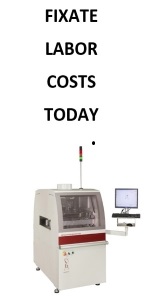| | |Hi all | | This Debate on lead free soldering is really hotting up here in Europe. From 2004 the use of lead in components and assemblies will be banned here. Also flame retardent halogens will be banned(FR4 etc). While we all agree that we have to move away from lead
Hi Bernard!
Well, this is a rather sore subject with me, because I truely believe that what once started out with the noble purpose of reducing or eliminating the toxics of lead, after I started looking closely at the whole issue, that can't possibly be the REAL reason.
I challenge any of you that is reading this, tell me that if we were all to stop using lead this VERY MINUTE, what difference it would make in our planet's problem with lead?
Use the INTERNET and find what percentage of lead our industry uses in comparison to the other industries...you'll see the same thing that myself and many others have discovered, that we use one fraction of a percent!
I don't know about anybody else, but in speaking for myself, the lead I use is logged, kept track of, and goes nowhere else but on printed circuit boards. Any other lead contaminated waste that I generate is recycled (dross), or disposed of properly as any hazardous waste should be.
Kids or people don't chew on printed circuit boards, so where are we contaminating the environment? There's studies done to show that any of the alternatives are JUST as TOXIC to the environment, maybe even more so!
I have a article that was published in SMT magazine as well as being presented at the Printed Circuits Expo in Long Beach that was done by engineers from K*Tec electronics that illustrates that point.
Another issue, is components. How many component manufacturers do you know that are using something other that tin/lead for the solderable surfaces? The only one I'm aware of that does it in a big way is Texas Instruments. How many threads have ya'll read about people having problems with their palladium finish? Temperature is another thing, most of the alternatives require that we'll have to use higher temperatures to reflow. As it stands now, many component vendors tell you that if you exceed 230-degrees centigrade all bets are off as far as guaranteeing reliability.
I wouldn't be so against something so sweeping as changing a primary substance that we all use in the products that we build and manufacture, if it would REALLY make a difference in the problem of lead pollution, or if someone could prove to me that by doing what we do REALLY contributes to the problem.
Everybody knows that lead is toxic and we shouldn't ingest it...hell, any 12-year old kid knows that. But I think the push to "lead free" lacks any real data that shows by doing what we are doing is harmfull.
Still, the train is coming and going to turn this industry upside down and create so many other issues that I'll bet when the train finally is running over us, we'll wish that it never happened!!
My humble opinion...
-Steve Gregory-
reply »
![]()
![]() Another basic soldering question. I notice that lead-free...
- Apr 27, 1999
by
Another basic soldering question. I notice that lead-free...
- Apr 27, 1999
by
![]()
![]() | Another basic soldering question. I notice that lead-fr...
- Apr 27, 1999
by
Justin Medernach
| Another basic soldering question. I notice that lead-fr...
- Apr 27, 1999
by
Justin Medernach
![]()
![]()
![]() | Another basic soldering question. I notice that lead-fr...
- Apr 27, 1999
by
Chrys
| Another basic soldering question. I notice that lead-fr...
- Apr 27, 1999
by
Chrys
![]()
![]()
![]() | |Hi all
This Debate on lead free soldering is really ...
- Apr 30, 1999
by
Bernard Mulcahy
| |Hi all
This Debate on lead free soldering is really ...
- Apr 30, 1999
by
Bernard Mulcahy
![]()
![]()
![]() | | |Hi all
|
| This Debate on lead free soldering is r...
- Apr 30, 1999
by
| | |Hi all
|
| This Debate on lead free soldering is r...
- Apr 30, 1999
by







